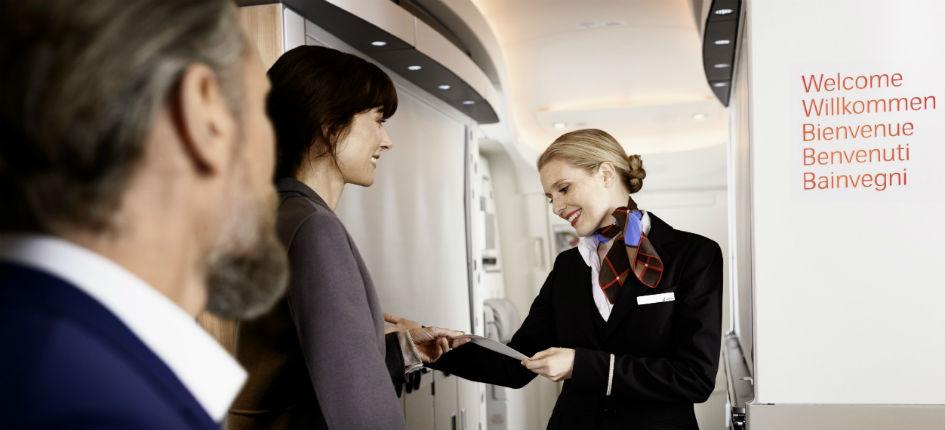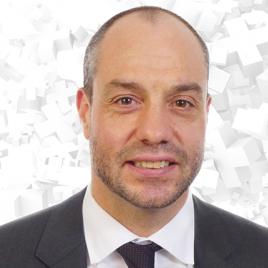The audience was quite amazed when René Caldart went through the rows of seats during his talk, shook hands with some of them, introduced himself with a: “Hello, my name is René, welcome to my team”, and invited them to join him up front. At the Aussenwirtschaftsforum, Caldart, cabin crew team leader and a steward at SWISS, simulated a crew briefing before a long-haul flight. None of the people he selected were flight attendants but they all had one thing in common with him: none of them knew each other and all were sitting at a table together for the first time. “This is how things are every day at SWISS,” Caldart explained. The airline’s 4500 cabin crew members come together in new constellations every new shift. “The likelihood that the same team comes together twice is very small.” Caldart’s talk was about how in a little over an hour a small group of strangers becomes a perfectly functioning team.
Stage 1. Forming
In the first part of his talk, the trained actor and cabaret artist explained the theoretical underpinnings as laid out by Tuckman’s stages model. Tuckman called the first stage of team building “forming”. For Caldart’s crew that corresponds to the time of the pre-flight briefing. “Cabin crew members are open, communicative people. They greet each other, introduce themselves, smile. You can feel an air of friendly collegiality. But as the team leader you must understand the uncertainty that reigns during this stage.” No member of the team knows who they will be working with together very closely over the next twelve hours, what position they will fill, how the boss ticks. “In this stage especially the choice of words is decisive,” says Caldart and illustrates this with an example: the work in the Business galley. Work in the business class kitchen is very demanding. Instead of saying, “Therese, you’ll do the Business galley,” Caldart expresses his appreciation and if no one volunteers says, “Therese, I remember what a great job you did when I flew with you recently. I need you in the Business galley.”
In keeping with the choice of words, Caldart does a sort of brainstorming with the team and repeats with them the SWISS values and together they formulate a motto for the upcoming flight.
Stage 2. Storming
As soon as the cabin crew steps onto the airplane and puts the last touches on the preparations in the cabin, the storming stage begins. “This is often a somewhat difficult time, with a lot of pressure. And the first disagreements may pop up; this is very normal in the development stage.” According to Caldart it is important for the leader not to get involved in little spats and to let people work things out themselves. “I only intervene when the team asks me to or when they come to me with their problem.” When this happens, it is essential to take charge and to act. “It is at this point that people are observing me as a leader. If I don’t act boldly then, a part of the team may try to circumvent me.”
Stage 3. Norming
The storming stage is usually rather short for the cabin crew. Passengers will start to board shortly after the crew has, look for their seats, need help stowing their luggage. The team has to act and the norming stage begins. If everything goes well, a sense of togetherness is built up and the team members work together well. “In this stage, too, I maintain an observer role as a leader. But I now intervene very quickly when something goes wrong,“ says Caldart. This might be the case if the standards or the motto agreed upon in the forming stage are not observed as they should. “Then it is my job to calmly point this out and to remind people of the values we defined in common.”
If the team’s sense of togetherness is palpably lacking, Caldart quickly speaks up. “It can happen when the team gets stuck in the storming stage and this takes up much too much energy,” says the team leader. “In that case, I’ll call the crew together in the business galley and close the curtain to the cabin for a few moments.” It is worthwhile to clear the air early in such situations. “Often it’s enough just to ask if we can restate our agreement again.” It is important to take control and intervene in order to deescalate.
Stage 4. Performing
In the Performing stage, roles are carried out efficiently and the team works together constructively. For René Caldart, this stage begins in the cabin when the first meal is served. “I hold back as much as possible. If something is not up to standards, I will tell them so afterwards. But I won’t accept shortcuts, SWISS standards must be maintained.”
On a long-haul flight, the last meal served just before landing is another challenge. “The crew is tired after ten hours in the air. I ask them how they are doing and encourage them with things like: ‘The last service was great. I got really good feedback. Let’s do it that way again’.” He tries to give his co-workers a platform for motivation, says René Caldart. “Only they can motivate themselves.”
About René Caldart:
He began with Swissair as a flight attendant in 1988. Today he is the team leader of the freelance cabin crew members and as such the direct superior of about 600 employees. He also still flies as a cabin steward. Caldart grew up in Val-de-Travers (NE) but has been living in Zürich since 1985. In 1995 he completed his training as an actor at the HB Studio in New York, after which he attended seminars on improv theatre with Keith Johnstone in Berlin and Munich. He still appears in various theatrical productions and does solo shows as a cabaret artist. In 1999 René Caldart was awarded the “Swiss Casinos Comedy Award”, now known as the “Swiss Comedy Award”.







